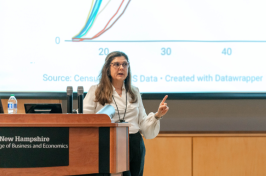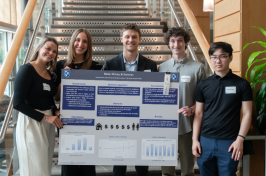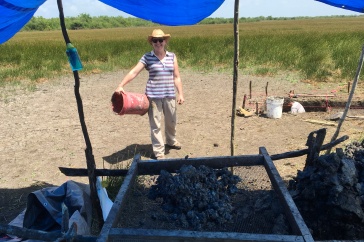Juan Luis Martínez had a habit of disappearing. In his groundbreaking 1977 book, The New Novel, Martínez wrote, "The universe is a phantom's effort to become reality," and the neo-avant-garde Chilean poet was something of a specter. He was fond of metaphysical vanishing acts: ducking behind collages, enigmas, quotes, and the words of others in his work and playing tricks on his readers.
But it wasn't until 2013, 20 years after Martínez died, that assistant professor of Spanish Scott Weintraub uncovered what might have been the author's greatest trick.
Weintraub has been studying Martínez's work since 2008. Last fall, while revising a chapter of his upcoming book on Martínez, he began searching for books by other writers named Juan Luis Martínez.
"It's a common name" in Latin America, Weintraub says. "There's a well-known attorney, a goalie in a soccer league, and so on. I thought I should order some of these books, just to see if there was anything there."
What Weintraub received, though, was a poetic bombshell. Among the pile of books Weintraub picked up at the Dimond Library was Le Silence et sa Brisure, by, presumably, another writer named Juan Luis Martinez. He stepped out of the library's front door and started reading. "By the time I made it down the stairs," he says, "I realized this was going to blow open my entire book."
The problem was this: the 17 poems in Le Silence et sa Brisure, published in 1976, were French translations of poems that appeared in Poems of the Other, a book of the Chilean Martínez's poetry. How did the work of a major Chilean poet appear, without notice, in a small book published in Paris a full year before his literary debut? Was the Martínez who wrote The New Novel the same Martinez who wrote Le Silence et sa Brisure, or was there another Martinez? Did the two know of each other? And, if so, were they working together?
"Martínez is an experimental writer who believes in writing the work of the other, who believes in appropriation and collages and very radical experimental writing procedures. But this was a different kind of appropriation than anything that he had ever produced," Weintraub says. "This question of naming and appropriation and translation was immediately fascinating. But I didn't realize just how far I'd be able to take it."
In the months that followed, Weintraub became a literary detective, looking for clues. In The Anonymous Poet (or Juan Luis Martínez's Present), a posthumous volume of the Chilean Martínez's work, the writer included a page from a French literary journal from the 1970s about a Catalonian poet named Juan Luis Martinez, along with a card catalog entry for Le Silence et sa Brisure. Meanwhile, the 17 poems in The Poems of the Other had been called anomalies in Martínez's work. "Everyone said, 'This is weird, it doesn't sound like him,'" Weintraub says. "And Martínez insisted, in every interview, that he didn't write those poems, that it was the 'other' Juan Luis Martinez, and everyone took it as a big joke."
Except Martínez wasn't joking. After months of phone calls to Geneva and the Ukraine, emails to editors in Switzerland and France, and a few dead-ends (including a Genevan acupuncturist also named Juan Luis Martinez), Weintraub found the "other" Juan Luis Martinez, a Swiss-Catalan writer who stopped publishing his poetry in 1993—the same year that the Chilean Martínez died—living in the Swiss Alps.
Since then, Weintraub has put some of the pieces together. The two Martínezes didn't know each other, though the Chilean Martínez had read and translated the other Martinez's poems and had two of them published under his own name in a Chilean newspaper in 1988. And at a conference in France in 1992, the Chilean Martínez introduced himself by reading one of the other Martinez's poems.
"No one knew just how literal (the Chilean Martínez) was," Weintraub says. "If you look at any of the interviews he gave, he said he believes we're not the masters of language, that he wants to disappear as an author. He really did it this time. And it took some very specific clues he put in a posthumous book to even intimate this might exist."
Weintraub's book about his discovery, Juan Luis Martínez's Final Trick: Not only Being Other but also Writing the Other's Work, was published this summer by Cuarto Propio in Chile. Meanwhile, the book that served as the catalyst for Weintraub's discovery, Juan Luis Martínez's Philosophical Poetics, is due from Bucknell University Press this month.
A colleague of Weintraub's called the discovery of the other Martinez a "bomb of evidence in the Chilean literary scene," and since his book was published, Weintraub says that he's gotten a few "very negative responses" from critics in Chile unhappy with the revelation. "They want to attack some small piece of it. They say that what Martínez did is plagiarism. It's a very impenetrable literary scene there, very bellicose. I also think, because I'm not Chilean, there's going to be some kind of pushback," he says.
He's taking the criticisms in stride, though, and so is the other Martinez. Though he was initially angry, the Swiss-Catalan Martinez quickly came to view the appropriation of his poems as a kind of metaphysical connection between himself and his Chilean namesake.
"He's honored that his words were good enough to be appropriated by another great poet, and he felt that it drew the two of them together in a way that transcended the corporeal," Weintraub says.
Perhaps most importantly, readers from all over the world are responding enthusiastically to Weintraub's book. "I get messages on Twitter from people who say, 'I just read your book—it's captivating, I laughed the whole way through,' and that doesn't really happen to an academic," he says. Though Martínez's work is filled with tricks, this may have been his most deft—turning a literary scholar from New Hampshire into an international detective.
— Larry Clow ’12G

















































